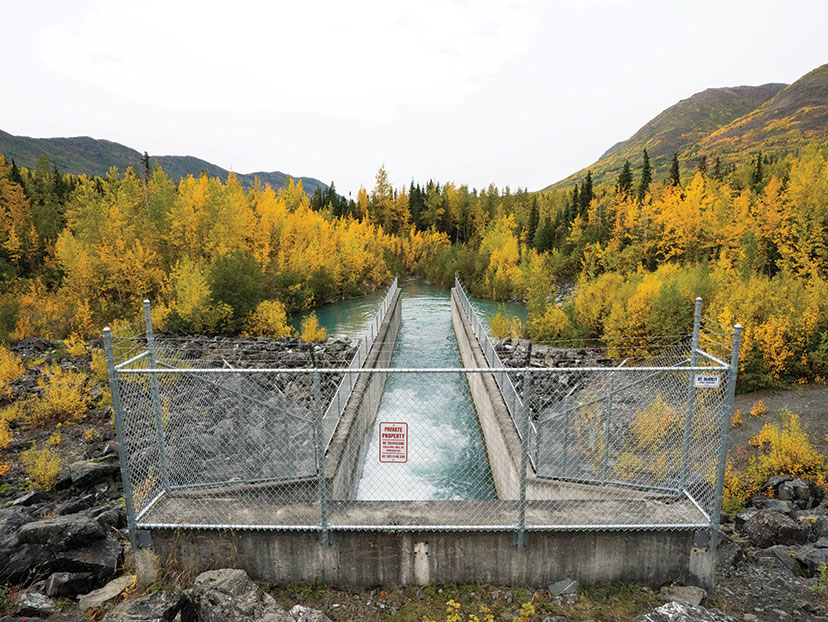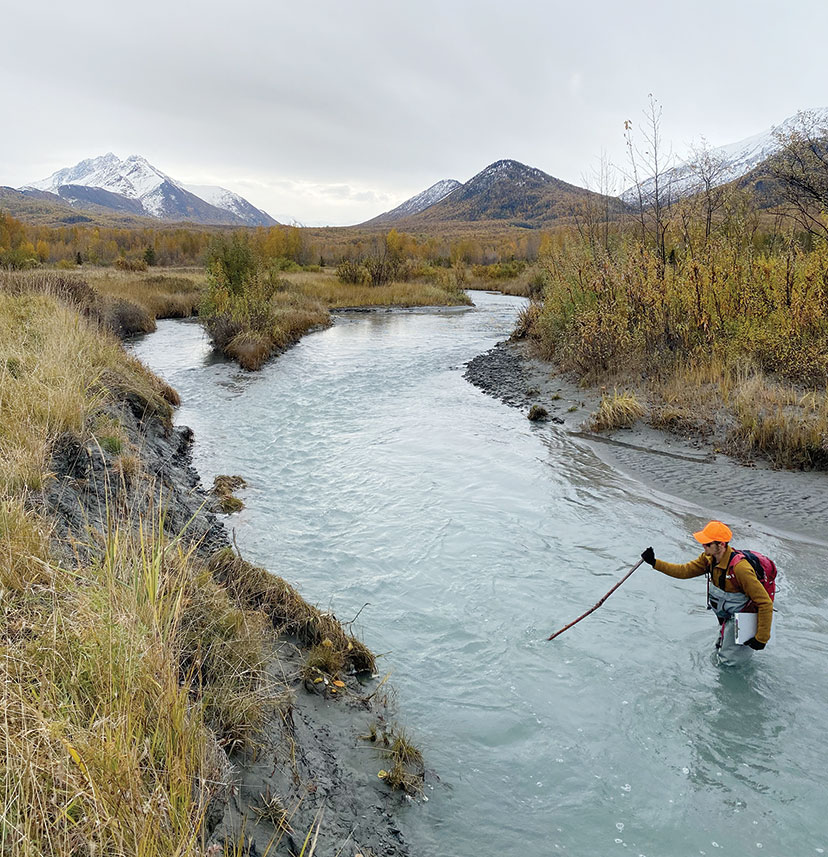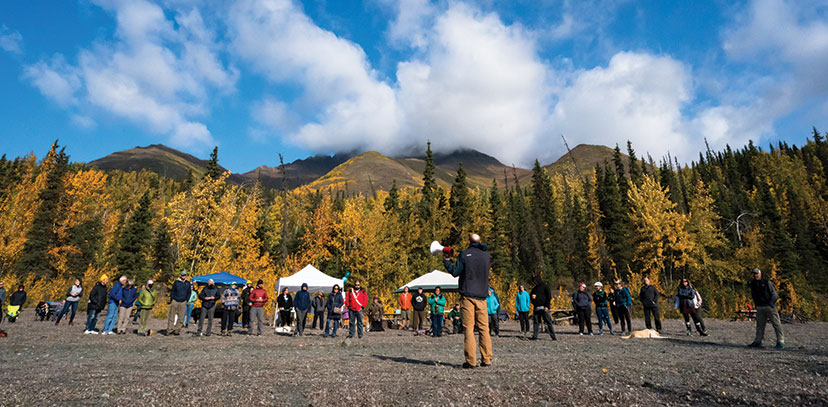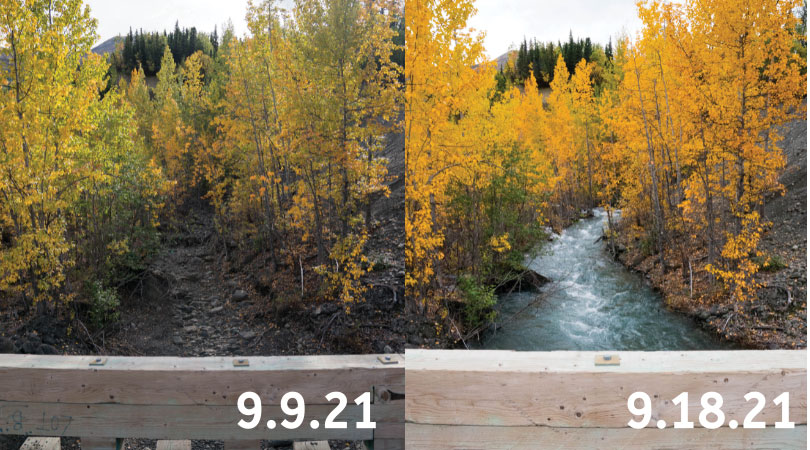A Future for the Eklutna River: Returning water and salmon to a Southcentral stream
Story by Eric Booton
In early September 2021, I walked the upper reaches of the Eklutna River canyon to snap some photos and survey the area. It was quiet and pleasant, but something was missing; the riverbed was dry. I returned to the exact same spot two weeks later. When I stepped out of my truck, the fall leaves rustled in the breeze, songbirds sang, and my ears welcomed the ever-pleasant sound of flowing water—the river was whole again, and I was one of many Alaskans there to celebrate.
Known to the Eklutna Dena’ina peoples as Idlughetnu, the Eklutna River is 45 minutes north of Anchorage and just a brief stroll from Native Village of Eklutna. The glacial river once supported strong runs of all five species of Alaska’s wild salmon and several species of resident fish, until the river’s water was diverted for hydroelectric power. This story of loss ripples throughout the world where salmon, steelhead, and other anadromous fish formerly thrived.
Over the last decade, many Native Tribes, Non-Government Organizations (NGOs) and agencies have taken the reins on repairing these impaired river systems in hopes of restoring wild fisheries that have all been lost. The success stories of dam removals on the Sandy River in Oregon, the Elwha River in Washington, and more, have spread across the country as stories of hope for repairing the damage we have done to wild fish and indigenous communities. With the support of Native Village of Eklutna, Trout Unlimited, and other stakeholders, the story of the Eklutna River has the potential to be the next story of hope for wild salmon.

Water is released out of the Eklutna dam. © Alex Troutman.
1929, blocked access to all but a fraction of the habitat required for salmon to survive. In 1955, a second project farther upstream took all the water from the outlet of Eklutna Lake, drying up the river and diverting its water away for other uses, pulling the rug out from the remaining wild salmon. These actions degraded the health of the wild-salmon fisheries, took a subsistence food source and conduit of culture from Native Village of Eklutna, and nearly wiped out an Alaska salmon stream.
In 2018, Eklutna, Inc., with support from The Conservation Fund and others, took the first major step toward restoring the river by successfully removing the 61-foot, abandoned lower Eklutna dam. This was a monumental $7.5 million investment in the future health of the river that reconnected over eight miles of upstream fish habitat

The lower stretches of the river during a fall 2021 survey. © Eric Booton.
With the biggest physical obstacle out of the way, the deck has been favorably stacked for utility companies to successfully return water and salmon to the Eklutna River. The Southcentral utility companies that now own the remaining hydroelectric project acquired it with the knowledge that they had the legal obligation to make up for the project’s impact to fish and wildlife. Now is their time to act to allow water to once again flow down the Eklutna River and allow salmon to migrate throughout the river and into the lake, which once hosted a robust sockeye population. Field studies to collect the valuable data necessary to propose mitigation measures to bring the salmon back began in 2021, and 2022 is set to be the second, and final year of field studies.
In September 2021, a water-release study was conducted to help scientists understand how the downstream river reacts to flowing water and what important fish habitat is available at varying flows. For just over three weeks, water was intentionally released out of the lake into the Eklutna River for the first time in more than 60 years. The river that was heavily degraded by historic hydroelectric impacts was briefly reborn, reminding us of the wild-salmon factory it once was, the one that drew the Eklutna Dena’ina to its banks, and a teaser of the future that is possible.
On Saturday, September 18, 2021, more than 150 Alaskans congregated on the bank of the flowing Eklutna River to celebrate water’s return to the river. For many tribal members, this was the first time they laid eyes on their namesake river with water flowing down it.

Native Village of Eklutna President Aaron Leggett speaks to the crowd at the water-release celebration. © Alex Troutman.
Aaron Leggett, President of Native Village of Eklutna said, “This has been a dream of ours. First to get the lower (Eklutna) dam taken out, and secondly, have water run unimpeded from Eklutna Lake all the way down the (Eklutna) River. And our ultimate goal is to restore the salmon runs that sustained us for many hundreds of years.”
While last fall’s water release was a symbolic highlight, it was an incomplete study, releasing only 10% of the river’s historic flow, and achieving just a fraction of the research that needs to be conducted to accomplish a complete field study. Over the course of summer and fall of 2022, contractors for the utilities, Native Village of Eklutna scientists and others will be wading the waters of the lower Eklutna River, and walking the dry riverbed of the upper river, to complete more scientific studies. Trout Unlimited and the Eklutna River Restoration Coalition will be there every step of the way to advocate for fish; access to 22 miles of salmon habitat and the health of a wild-salmon stream are on the line.
These next few years are crucial in determining the future health of the river. Aaron’s dream for Eklutna—to see water and fish return to the river that previously sustained his ancestors—is an achievable one. If Municipal Light & Power, Chugach Electric and Matanuska Electric Association, as the owners of the Eklutna Hydroelectric Project, return enough water to the river, we can have a salmon stream supporting five species of salmon within the Anchorage municipality once again. That is a dream we can all get behind.
To follow along and support restoration of the Eklutna River, please visit EklutnaRiver.org.

Dry vs flowing Eklutna: The Eklutna River before and during the 2021 water release. © Alex Troutman.
Eric Booton is the Eklutna Project Manager & Sportsmen Coordinator for Trout Unlimited’s Alaska Program. Conserving and restoring fish habitat are his 9-5; chasing wild fish is his summer and fall pastime. Follow Trout Unlimited Alaska on Facebook for updates on defending Alaska’s Recreational Rivers and more.
For more conservation articles please visit here.
